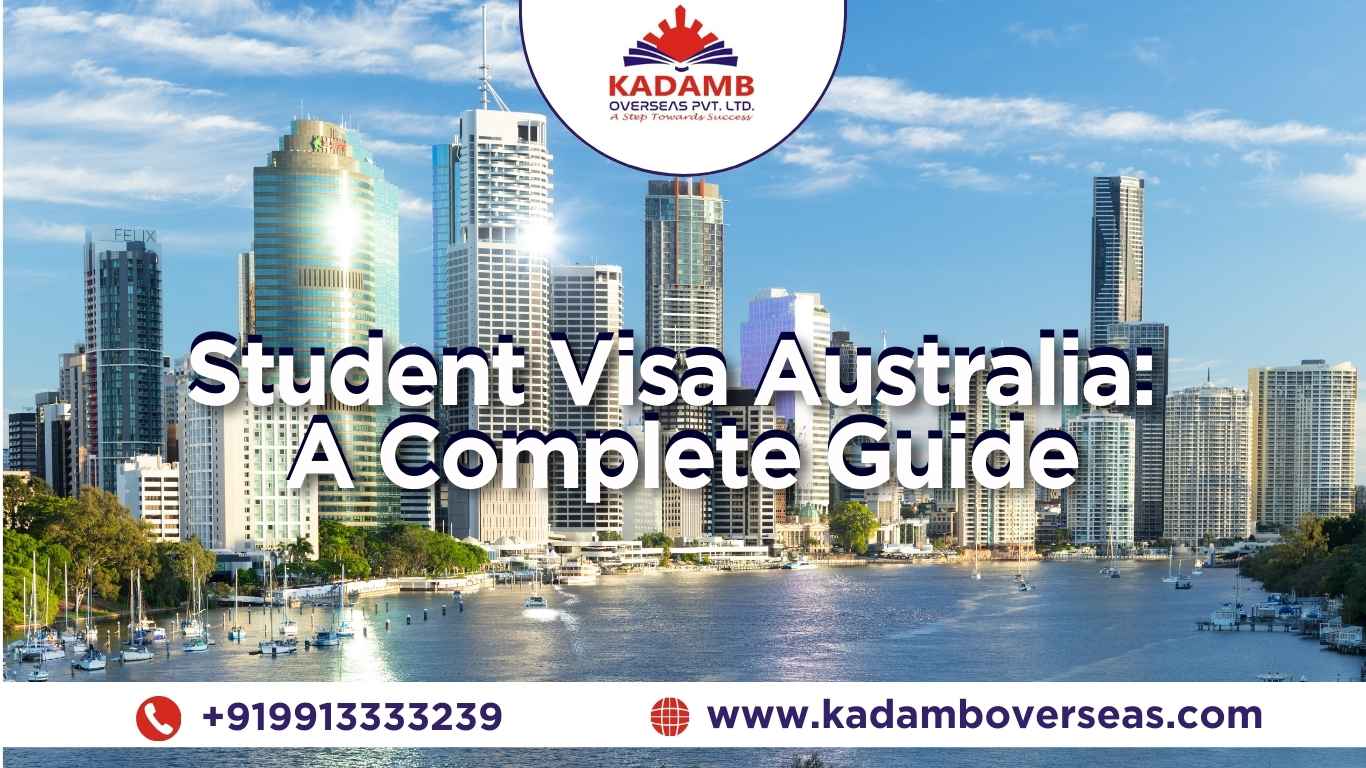For international students looking to pursue higher education in Australia, knowing the visa rules is key.
Getting a student visa for Australia takes a few steps and needs careful planning.
Future students must meet certain requirements and have the right documents to apply for a visa.
Key Takeaways
- Understand the eligibility criteria for a student visa australia.
- Gather required documents for the visa application.
- Learn about the application process for study in australia visa.
- Know the importance of meeting the eligibility criteria.
- Familiarize yourself with the necessary documentation.
Understanding the Australian Student Visa System
For students from abroad, knowing the Australian student visa system is key. It helps them smoothly start their studies in Australia. The system makes sure students follow rules and meet certain needs.
Overview of Subclass 500 Student Visa
The Subclass 500 visa is for most international students going to Australia. It lets students take full-time courses at approved schools. To get it, you need an offer of enrollment and must meet financial and health checks.
Key Benefits of Studying in Australia
Studying in Australia brings many perks. You get top-notch education, cultural diversity, and research chances. Australian schools are known worldwide for their quality. Degrees from here are sought after by employers everywhere. For more info, check Kadamb Overseas.
Recent Changes to Student Visa Policies
The Australian government has updated student visa rules. These changes make applying easier and improve the student experience. Now, there are simpler documents and more flexible English tests. It’s important for students to know these updates to meet the student visa requirements.
Eligibility Requirements for Australian Student Visas
To get an Australian student visa, you first need to meet certain criteria. The Australian government has set specific rules for applicants.
Age and Academic Requirements
Applicants must be of a certain age and have the right academic background. There’s no maximum age limit. But, you need to have finished your previous education to apply for the next level.
| Course Level | Academic Requirement |
|---|---|
| Higher Education | Completion of secondary education or equivalent |
| Postgraduate | Bachelor’s degree or equivalent |
| ELICOS (English Language Courses) | Completion of secondary education or equivalent |
English Language Proficiency
Being good at English is key for success in Australia. You need to show your English skills through tests like IELTS, TOEFL, or PTE. The scores needed vary by school and course.
Genuine Temporary Entrant (GTE) Requirement
The GTE requirement is very important for your visa. You must show you plan to stay in Australia only to study. You’ll need to provide proof of your education, money, and ties to your home country.
Character and Health Requirements
You also need to meet character and health standards. This means getting health checks and police certificates to show you’re a good person.
Health Requirements: You might need medical tests to make sure you’re healthy.
Character Requirements: You’ll need police certificates to prove you’re of good character.
Types of Australian Student Visas
International students have many visa options to study in Australia. The Australian government has made the visa process easier. This helps students with different needs and situations.
Subclass 500 Student Visa
The Subclass 500 Student Visa is for international students. It lets students stay in Australia for their course’s length. To get it, students need an offer of enrollment from an Australian school. They also must show they can speak English well enough.
Student Guardian Visa (Subclass 590)
The Student Guardian Visa is for parents or guardians of students under 18. It lets them stay with the student in Australia. This visa is for taking care of the student’s needs while they study.
Temporary Graduate Visa (Subclass 485)
After finishing their studies, students can apply for the Temporary Graduate Visa (Subclass 485). This visa lets graduates live, study, or work in Australia for a while. It’s a chance to get work experience in their field.
Student Visa for Family Members
Family members of student visa holders might get a visa to come to Australia. The rules depend on the family member’s relationship and situation.
| Visa Type | Purpose | Eligibility |
|---|---|---|
| Subclass 500 | Study in Australia | Offer of enrollment, English proficiency |
| Subclass 590 | Guardian for under 18 students | Parent/guardian of a Subclass 500 visa holder |
| Subclass 485 | Post-study work | Completed a degree in Australia, meet specific work experience requirements |
For more detailed information on transitioning from a student to a resident in Australia, visit this guide.
Financial Requirements for Student Visa Australia
Financial needs are key when applying for a student visa in Australia. It’s important to know what you need financially to apply smoothly.
Proof of Sufficient Funds
You must show you have enough money for tuition, living costs, and other expenses in Australia. Bank statements or other financial documents can prove this.
Financial Capacity Assessment
The Department of Home Affairs checks if you can afford to live in Australia. They look at your income, savings, and other money you have.
Scholarships and Financial Aid Options
There are many scholarships and financial aids for international students. These can help make studying in Australia less expensive. Some well-known scholarships include the Australia Awards and Endeavour Postgraduate Scholarships.
Living Cost Estimates for Different Cities
The cost of living in Australia changes a lot depending on the city. Here’s a look at living costs in major cities:
| City | Estimated Annual Living Cost |
|---|---|
| Sydney | $21,041 – $24,444 |
| Melbourne | $19,444 – $22,847 |
| Brisbane | $18,247 – $21,650 |
A recent report says living in Australia can be pricey. But, with good planning, students can handle their expenses well.
“Students should research their accommodation options thoroughly and consider sharing with others to reduce costs.”
Essential Documents for Student Visa Application
To apply for a student visa in Australia, you need to know the documents required. The process can be tricky, but being ready can make it easier.
Confirmation of Enrollment (CoE)
The first important document is the Confirmation of Enrollment (CoE). It’s given by the Australian school you’re joining. This proves you’re enrolled in a course.
Valid Passport and Identification
You need a valid passport that’s not about to expire. This is key to avoid delays. Also, you must provide identification documents like a birth certificate or ID card.
Academic Transcripts and Certificates
Submit your academic transcripts and certificates with your application. They show your education and qualifications.
English Proficiency Test Results
Most schools in Australia ask for proof of English language proficiency. You might need to take IELTS, TOEFL, or PTE Academic. Make sure to include your test scores with your application.
Statement of Purpose and Financial Documents
A strong Statement of Purpose is essential. It should explain why you chose Australia and your course. You also need to show you can afford to study there. This includes proof of tuition fees and living costs.
It’s important to make sure all your documents are correct and complete. Also, check with your school and the Australian Department of Home Affairs for the latest rules.
- Confirmation of Enrollment (CoE)
- Valid Passport and Identification
- Academic Transcripts and Certificates
- English Proficiency Test Results
- Statement of Purpose and Financial Documents
Student Visa Australia: A Complete Guide to Visa and Entry Requirements
Going to study in Australia means you need to know how to apply for a student visa. The application process has many steps, from getting ready to sending in your application. Knowing these steps is key to a successful application.
Overview of the Application Journey
The student visa application process starts with knowing what you need and gathering your documents. It’s a journey with several steps. You’ll need to submit an online application, give biometrics, have health checks, and wait for a decision.
To do well in this process, start early and keep everything organized. The Australian Department of Home Affairs has all the details on their website. It’s important to check it often during your application.
Pre-Application Checklist
Before you apply, make a pre-application checklist. This list should include:
- Confirming your enrollment with an Australian education provider
- Gathering financial documents to prove your capacity to support yourself
- Preparing your academic transcripts and certificates
- Ensuring your passport is valid for the duration of your stay
- Undergoing any required health examinations
For more details on financial needs, see our guide on work permit after study in Australia.
Biometrics and Health Examinations
As part of the application, you might need to give biometrics and have health examinations. Biometrics mean giving fingerprints. Health checks make sure you meet health standards for visa applicants.
Visa Decision Process
After you apply, the Australian Department of Home Affairs will review it. The visa decision process checks if you meet the criteria. This includes your academic background, financial situation, and health.
When a decision is made, you’ll get an email. If your visa is approved, you’ll get a letter with your visa details.

Step-by-Step Application Process
To study in Australia, you must go through a few steps. This process is online and needs careful preparation. Make sure you meet all the requirements.
Creating an ImmiAccount
The first thing to do is create an ImmiAccount on the Australian Government’s website. This account is key for your visa application.
Completing the Online Application Form
After setting up your ImmiAccount, fill out the online form for a Student Visa (Subclass 500). You’ll need to provide personal details and information about your course.
Submitting Supporting Documents
After filling out the form, you’ll need to send in documents. These include your Confirmation of Enrollment (CoE), proof of money, and English test results.
| Document | Description |
|---|---|
| Confirmation of Enrollment (CoE) | Proof of enrollment in a registered Australian course |
| Proof of Financial Capacity | Evidence of enough money for tuition and living |
| English Language Proficiency | Results from approved English language tests (e.g., IELTS, TOEFL) |
Tracking Your Application Status
After applying, you can check your status on your ImmiAccount. Keep an eye on it and be ready to give more info if needed.
Responding to Additional Information Requests
Sometimes, the Department of Home Affairs will ask for more info. Answer quickly to avoid delays.
By following these steps and having all your documents ready, you can smoothly apply for a student visa in Australia.
Student Visa Costs and Processing Times
Knowing the costs and how long it takes to get a student visa is key for planning your studies in Australia. The money and wait time can really affect your choices.
Base Application Fees
The base fee for a student visa (Subclass 500) is a big upfront cost. As of the latest updates, it’s about AUD 630. This fee is required and not refundable, no matter the outcome of your application.
Additional Costs to Consider
There are extra costs to think about too. These include health insurance, medical checks, English tests, and translating documents. Also, plan for living and accommodation costs while waiting for your visa.

Expected Processing Timeframes
How long it takes to process a student visa can change. It depends on your application’s complexity and the office’s workload. Usually, it’s 4 to 6 weeks. But, apply early to avoid any delays.
Priority Processing Options
For those who need it faster, there’s priority processing. It’s for students with urgent start dates or those who must travel quickly. But, it costs extra.
| Service | Cost (AUD) | Processing Time |
|---|---|---|
| Standard Student Visa Application | 630 | 4-6 weeks |
| Priority Processing | Variable | Less than 4 weeks |
Health Insurance Requirements (OSHC)
Australia requires Overseas Student Health Cover (OSHC) for all international students. It’s key to know its rules. OSHC is a must for the student visa process. It makes sure students can get medical care while in Australia.
Mandatory Overseas Student Health Cover
OSHC is a must for all international students with a student visa (subclass 500). You need to buy it before you arrive in Australia. It must stay active for as long as you’re there. OSHC covers medical costs like hospital stays and doctor visits.
OSHC Providers and Coverage Options
Many approved providers offer OSHC in Australia, like Bupa, Medibank, and NIB. Each has different plans with different coverage levels. Students should look at these options to find the best fit for them.
| Provider | Basic Coverage | Additional Benefits | Cost (approx.) |
|---|---|---|---|
| Bupa | Hospital, medical, ambulance | Dental, optical, physiotherapy | $250-$400 per year |
| Medibank | Hospital, medical, ambulance | Extras cover options | $220-$380 per year |
| NIB | Hospital, medical, ambulance | Travel insurance options | $240-$420 per year |
Exemptions and Special Cases
Some students might not need OSHC. This includes those with health care agreements with Australia or those covered by a parent’s or spouse’s insurance. It’s important to check if you’re exempt.
What OSHC Does and Doesn’t Cover
OSHC covers many medical services, but not all. It usually doesn’t cover dental, eye care, or physiotherapy unless your plan includes it. Knowing what’s covered helps avoid surprise medical bills.
Work Rights on an Australian Student Visa
As an international student in Australia, knowing your work rights is key. Your visa lets you work within certain limits while studying. This helps balance your studies and earning needs.
Working Hour Limitations During Study Periods
Student visa holders can work up to 48 hours every two weeks during the school year. This rule helps you focus on studying. It’s important to monitor your hours to stay within visa rules.
Unlimited Work Hours During Scheduled Breaks
Working unlimited hours during breaks is a visa perk. It lets you earn more and get work experience in your field. This is a great way to gain skills and income.
Family Member Work Rights
Family members of student visa holders might also work in Australia. For example, a partner with a Subclass 500 visa can work, under certain rules.
Tax File Number and Employment Rights
Getting a Tax File Number (TFN) is essential when you start working. It ensures you pay the right taxes. It also affects your job rights and benefits.
It’s important to understand and follow your work rights on your Australian student visa. This keeps your visa status in good shape. Always check the latest rules from the Australian Government’s Department of Home Affairs.
Student Visa Conditions and Compliance
Knowing the rules of your Australian student visa is key for a good study experience. You must follow these rules to enjoy your time in Australia fully.
Maintaining Enrollment and Attendance
Keeping up with enrollment and satisfactory attendance is a big rule. Always check if you’re enrolled right and if you’re meeting your school’s attendance needs.
Academic Progress Requirements
It’s also important to meet academic progress requirements. You need to do well in your studies, finish subjects, and get good grades. If you don’t, your school might take action and it could affect your visa.
Reporting Changes in Circumstances
You must tell the Department of Home Affairs about any changes in circumstances. This includes changes in your school, address, or money situation. Keeping your info current is key to staying in line.
Consequences of Visa Condition Breaches
Breaking your student visa rules can lead to big problems. This includes having your visa cancelled and not being able to come back to Australia. It’s very important to follow these rules to avoid these issues.
In short, knowing and following your student visa rules is essential for your success and legal status in Australia. Always check these rules and ask for help if you’re not sure about anything.
Extending Your Student Visa in Australia
If you want to keep studying in Australia after your visa ends, you need to know how to extend it.
Valid Reasons for Extension
You can extend your student visa if you have a good reason. This includes continuing your current course, starting a new one, or moving to a higher education program.
Extension Application Process
To extend your visa, you must apply online through your ImmiAccount on the Australian Department of Home Affairs website. Make sure to apply before your visa expires.

Bridging Visa Arrangements
If your visa ends while you wait for an extension decision, you might get a bridging visa. This lets you stay in Australia legally until a decision is made.
Changing Education Providers or Courses
If you want to switch schools or courses, tell the Department of Home Affairs. Sometimes, you’ll need to apply for a new student visa.
| Scenario | Action Required |
|---|---|
| Continuing current course | Lodge a new student visa application |
| Starting a new course | Apply for a new student visa |
| Changing education provider | Notify Department of Home Affairs |
Post-Study Pathways and Options
Australia has many post-study options for international students. These options help them grow in their careers. After finishing their studies, they can choose different paths to succeed.
Temporary Graduate Visa Options
The Temporary Graduate Visa (subclass 485) is a favorite among international students. It lets them live, study, or work in Australia for a while. There are two types: the Graduate Work Stream and the Post-Study Work Stream.
- Graduate Work Stream: For graduates with skills in specific jobs.
- Post-Study Work Stream: Allows graduates to work based on their qualification level.
Skilled Migration Pathways
Australia’s skilled migration program aims to attract talented people. Graduates can look into visas like the Skilled Independent Visa (subclass 189) or the Skilled Nominated Visa (subclass 190).
Points-based assessment is key. It awards points for age, qualifications, work experience, and language skills.
Employer Sponsorship Opportunities
Graduates can also look into employer sponsorship for permanent residency. Employers can sponsor skilled workers through visas like the Employer Nomination Scheme (subclass 186) and the Regional Sponsored Migration Scheme (subclass 187).
Further Study Possibilities
Australia also offers postgraduate and doctoral programs for further education. Graduates can get a new student visa to get more qualifications. This can boost their career prospects.
| Post-Study Pathway | Description | Eligibility Criteria |
|---|---|---|
| Temporary Graduate Visa | Temporary visa for graduates to work or study in Australia. | Recent graduate from an Australian institution, meets specific qualification and English language requirements. |
| Skilled Migration | Permanent residency pathway for skilled workers. | Meets points-based assessment criteria, has relevant qualifications and work experience. |
| Employer Sponsorship | Pathway to permanent residency through employer nomination. | Employer sponsorship, meets specific qualification and work experience requirements. |
Common Reasons for Student Visa Rejection and Appeals
It’s important for international students to know why their visas might be rejected. A rejected visa can really set back your study plans. Knowing what to avoid can help you stay on track.
Insufficient Financial Evidence
Not having enough money is a big reason for visa rejections. You need to show you can pay for your studies and living costs in Australia.
- Bank statements showing adequate savings
- Scholarship award letters
- Sponsorship documents, if applicable
Failing the Genuine Temporary Entrant Test
The Genuine Temporary Entrant (GTE) test is key for visa applications. You must show you plan to stay in Australia only for your studies.
Key factors considered in the GTE assessment include:
- Ties to the home country
- Reasons for choosing Australia for education
- Post-study plans
Incomplete Documentation
Applying with missing documents is another common mistake. Make sure you include everything needed.
Essential documents typically include:
- Confirmation of Enrollment (CoE)
- Valid passport
- Academic transcripts and certificates
- English language proficiency test results
Health and Character Concerns
Health and character issues can also cause visa rejections. You must meet health standards and show you have a good character.
Administrative Appeals Tribunal Process
If your visa is rejected, you can appeal through the Administrative Appeals Tribunal (AAT). The AAT can look over the Department of Home Affairs’ decision.
The appeals process involves:
- Submitting an application for review to the AAT
- Providing additional information or evidence to support the appeal
- Attending a hearing, if required
Preparing for Life in Australia as an International Student
As an international student heading to Australia, it’s key to know what makes your stay great. Australia is famous for its top-notch education and friendly vibe. But, there’s more to a good experience than just school.
Accommodation Options
Finding the right place to live is important. You can choose from university dorms, private homes, or homestays. University dorms are great for meeting people, while private homes give you more freedom. Homestays let you live with an Aussie family.
Banking and Transportation
Opening a local bank account is easy, with banks ready for international students. Australia’s public transport is excellent, with buses, trains, and trams. Many schools also help with getting around.
Cultural Adjustment Tips
Getting used to a new culture can be tough. Being open and trying new things is helpful. Universities often have programs and events to help you settle in.
Student Support Services
Australia’s universities offer lots of help, like academic support and health services.
Knowing these things can help international students have a great time in Australia.
Conclusion
Getting a student visa australia can seem hard, but with the right help, you can do it. This guide has covered all you need to know about getting a study in australia visa. It includes the different types of visas and what you need financially and health-wise.
To apply smoothly, check if you meet the criteria and have all your documents ready. Apply early to start your studies in Australia without any issues.
This guide has prepared you to apply for a student visa australia confidently. Keep up with any changes to visa rules to avoid problems. Plan ahead to make your educational journey in Australia a success.
To get a student visa in Australia, you need to meet some requirements. You must be of the right age and have good grades. You also need to speak English well and pass the Genuine Temporary Entrant (GTE) test. You must also show you’re healthy and have good character.
To apply for a student visa, first create an ImmiAccount. Then, fill out the online form and submit your documents. Keep an eye on your application’s progress.
You’ll need a few important documents for your visa. These include a Confirmation of Enrollment (CoE) and a valid passport. You’ll also need your academic records and English test scores.
The cost of a student visa varies. You should also think about extra costs. These might include health insurance and biometric data fees.
Yes, you can work part-time with some limits. During breaks, you can work more hours. Your family members might also be able to work.
OSHC is health insurance for international students in Australia. Most student visa holders need it. It covers some medical costs, but the coverage varies by provider.
Processing times for student visas vary. Some are quick, while others take longer. If you need it faster, there are options.
Yes, you can extend your visa under certain conditions. This includes continuing your studies or changing schools. You’ll need to apply again and meet the criteria.
After finishing your studies, you have several options. You might get a Temporary Graduate Visa, try for skilled migration, find a job through sponsorship, or study more.
If your visa is rejected, you can appeal. You can do this through the Administrative Appeals Tribunal (AAT) if you think the decision was wrong. Common reasons for rejection include not having enough money, failing the GTE test, or missing documents.



